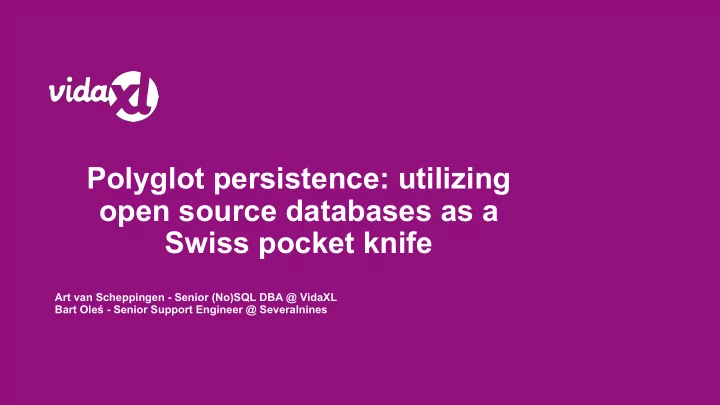

Polyglot persistence: utilizing open source databases as a Swiss pocket knife Art van Scheppingen - Senior (No)SQL DBA @ VidaXL Bart Oleś - Senior Support Engineer @ Severalnines
Who are we?
VidaXL Company Stats • Online retailer in (mostly) slow moving goods • Founded 2008 • 350M turnover, 40% growth yearly • 1500 employees (US, CN, AU, IN, RO, UA) • HQ in the Netherlands • 4 warehouses worldwide (NL, US and AU)
How does VidaXL sell its goods? • Own webshop platform in EU, US and AU • Warehouses in NL, US and AU • Selling on other platforms, e.g. Amazon, eBay • Allow selling on our own platform using Mirakl • B2B drop-shipments
VidaXL Technical Foundations • SAP as ERP system • Genesys as CS system • Webshop • Open source web-based development strategy • PHP / NodeJS • Docker • Cloudflare workers
VidaXL DevOps Datastores • MySQL • MariaDB (Galera) clusters • MySQL replication • PostgreSQL • SOLR • Elasticsearch • ELK • MongoDB • Couchbase • (RabbitMQ) • Prometheus
What is Polyglot Persistence? Using multiple specialized persistent stores rather than one single general-purpose database
Where does the term come from? • The way we work is changing • Enterprise applications are becoming more complex • Separate (devops/agile) teams • Ownership of applications • (Micro)services • Everyone has their preference • Various programming languages • Various storage systems
Where does the term come from? • Monoglot Programming • Only one programming language allowed • Readability • All code is in the same language • Support • One platform to support • Knowledge • Everybody is an expert • Is there a jack-of-all-trades language?
Where does the term come from? • Monoglot Programming • Only one programming language allowed • Readability • All code is in the same language • Support • One platform to support • Knowledge • Everybody is an expert • Is there a jack-of-all-trades language?
Monoglot programming •
Monoglot programming Carpenters actually use a broad variety of tools
Polyglot Programming Polyglot Programming • Use programming languages for what they are good at • Flexibility • • Use Java for a secure API • Use Scala for real time stream processing • Use Python for text analysis • Tie everything together using AngularJS Knowledge • • Everybody is expert at one or more languages
Polyglot Programming
Monoglot Persistence
Data storage landscape changes Relational data stores (RDBMS) • Key-Value data stores (“NoSQL”) • Columnar data stores (OLAP) • Document data stores (NoSQL) • Graph data stores (GDB) • Big Data •
Data storage landscape changes Software RDBMS Oracle, MySQL, PostgreSQL Key-Value Redis, Riak Columnar InfiniDB, Clickhouse Document MongoDB, Couchbase Graph Neo4J, Janusgraph Big Data Hadoop
Data storage landscape changes Software AWS Google RDBMS Oracle, MySQL, RDS, Aurora CloudSQL, Spanner PostgreSQL Key-Value Redis, Riak DynamoDB Datastore Columnar InfiniDB, Clickhouse Redshift BigQuery Document MongoDB, SimpleDB Bigtable Couchbase Graph Neo4J, Janusgraph Neptune Big Data Hadoop EMR Cloud Dataproc
Even Hadoop has become a polyglot
Polyglot Persistence Complex problems require different storage systems • Use the right tool for the job, for example • Use PostgreSQL for financial data • Use MySQL for website contents • Use MongoDB for user profiles • Use Cassandra for real time streams • Use Neo4J for recommendation analysis •
Use the right tool for the right job Document storage: MongoDB
Use the right tool for the right job Columnar storage: Cassandra
Use the right tool for the right job Graph storage: Neo4J
Polyglot Persistence
Polyglot Persistence at VidaXL Yes we certainly are polyglots!
Quick recap on our data stores • MySQL • MariaDB (Galera) clusters • MySQL replication • ProxySQL • PostgreSQL • SOLR • Elasticsearch • ELK • MongoDB • Couchbase • (RabbitMQ) • Prometheus
How did this happen? • Continuous growth • Hardly any time to overhaul existing systems • Transition from monolith to microservice architecture • For each microservice the most optimal solution has been chosen • Early adopters of new technology • Gaining advantage over competition
From monolith to microservice
From monolith to microservice
From monolith to microservice
From monolith to microservice
From monolith to microservice
From monolith to microservice
What were the challenges? • Automation • Increased complexity • Systems monitoring • Multiple integrations • Maintenance becomes more difficult • Backups • Scaling • Software updates • DevOps are not a DBA
What were the solutions? • Invest in automation • Never perform any (large) task thrice • Increase tooling • Build it ourselves costs time • Buying/licensing tools costs money • Keeping the headcount low saves money • Focus on systems that matter most • Get (exteneral) help • Hire DBAs! ;)
ClusterControl by Severalnines <some subtitle here?>
Thank you
Recommend
More recommend